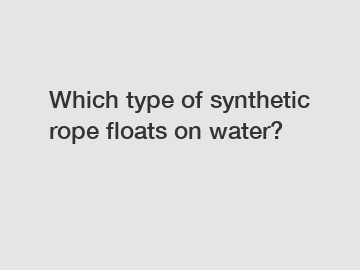Which type of synthetic rope floats on water?
Which Type of Synthetic Rope Floats on Water?
Synthetic ropes are becoming increasingly popular due to their durability, strength, and versatility. They are commonly used in a wide range of applications, from marine activities to construction projects. When it comes to water-related activities, such as boating or fishing, the ability of a rope to float on water becomes a crucial factor to consider. In this article, we will discuss the different types of synthetic ropes available in the market and identify which ones are known for their buoyancy.
Polypropylene Ropes: Lightweight and Buoyant.

Polypropylene ropes are known for their floating capabilities, making them an excellent choice for water-based activities. This type of synthetic rope is made from polypropylene fibers, a petroleum-based material that has a low density. The low density of polypropylene contributes to the rope's buoyancy, allowing it to float on water effortlessly. Whether you are looking for a rope to use in marine activities, rescue operations, or even water sports, polypropylene ropes are an ideal option.
Polyethylene Ropes: Another Lightweight and Buoyant Option.
Polyethylene ropes are also well-known for their ability to float on water. Like polypropylene ropes, polyethylene ropes have a low density that allows them to remain buoyant. Polyethylene fibers are commonly used to produce this type of synthetic rope, and their lightweight nature makes them an excellent choice for water-related applications. From small-scale boating to heavy-duty marine operations, polyethylene ropes are widely used due to their remarkable buoyancy and strength.
Nylon Ropes: Dense and May Not Float.
Nylon ropes are renowned for their strength and resistance to abrasion – qualities that make them suitable for various demanding applications. However, when it comes to buoyancy, nylon ropes may not be the best choice. Nylon has a higher density compared to polypropylene and polyethylene, causing most nylon ropes to sink in water. Despite this, nylon ropes are still highly regarded for their durability, and they retain their superior strength even when submerged. If buoyancy is not a primary concern for your specific application, then nylon ropes may still be a viable choice.
Dyneema Ropes: Versatile and Engaging Buoyancy Properties.
Dyneema ropes are a newer entrant to the synthetic rope market but have quickly gained popularity due to their exceptional strength-to-weight ratio. While Dyneema ropes do not inherently float on water, they have the unique ability to be engineered to be either buoyant or sinkable, depending on their intended purpose. By adding a specific coating or treating the rope's fibers, manufacturers can manipulate the buoyancy properties of Dyneema ropes. This versatility makes them suitable for a range of water-based activities, including offshore sailing and deep-sea diving.
Conclusion.
When selecting a synthetic rope for water-related activities, the buoyancy of the rope becomes a crucial factor to consider. Polypropylene and polyethylene ropes are well-known for their ability to float on water due to their low densities. On the other hand, nylon ropes generally sink in water but offer excellent durability and strength. Dyneema ropes, while not naturally buoyant, can be engineered to either float or sink depending on the coating or treatment applied to them. Each type of synthetic rope has its own strengths and applications, so it is essential to choose the one that best suits your specific needs.
If you have any further questions or would like to explore different synthetic rope options, feel free to contact us. Our team of experts is always ready to assist you in finding the perfect rope for your needs.
For more Rope Braid Types, Natural Fiber Rope, Braid on Braid Ropeinformation, please contact us. We will provide professional answers.

Comments
0